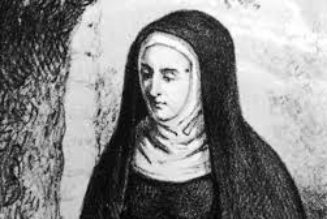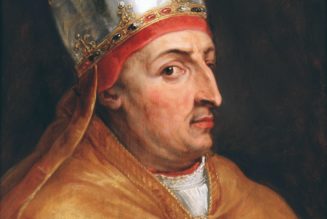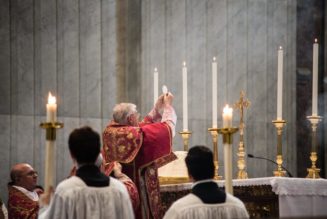, December 19, 2019
 It is appropriate that the Church focuses on St. Joseph for the Fourth Week of Advent, Year A.
It is appropriate that the Church focuses on St. Joseph for the Fourth Week of Advent, Year A.
Joseph is the patron saint of preparing for Christmas — and, as Patron of the Church, for the Second Coming of Christ.
We are closer than ever before to the Second Coming of Christ.
We are living in the world’s “fourth week of Advent” — the end days, according to the Church; “the last hour.” It’s time for last-minute preparations, the same preparations as Joseph made.
First, Joseph took his wife’s cross onto himself.
When Mary is found with child, “Joseph her husband, since he was a righteous man, yet unwilling to expose her to shame, decided to divorce her quietly.”
You don’t have to know anything about the ancient world to understand what this means. If a man’s new wife is found with child, he could noisily complain, saying she is pregnant and not by him, shaming her. Or he could slip away without a word. That would make everyone assume he impregnated her then abandoned her. That would shame him.
That is what Joseph chose to do, and this is what we are supposed to do — take crosses away from others and carry them ourselves.
Too often we do the opposite. In small ways and large, we make those around us carry our burdens: We make them share in our bad moods, or suffer for our greed, or laziness, and we may even walk away from major commitments, from an unpleasant job, or duty at home, or our marriage itself, leaving others crushed by the consequences of our freedom.
But St. Joseph showed true Christianity, which isn’t a series of grand gestures that ennoble us, but the willingness to do hard things that diminish us.
Second, Joseph allowed himself to be a subplot.
It’s instructive to compare the two angelic visits — Joseph’s and Mary’s.
The Annunciation to Mary begins with the angel saying “Hail Mary, full of grace,” then makes clear that she is a special person chosen by God for a historic task of salvation history. To Joseph, the angel says, “Joseph, son of David,” then tells him to serve Mary. Joseph is not called forth as a great man — he is called a the descendant of a great man. His life wasn’t foreseen by prophecy. He isn’t the forerunner or the Godbearer. He is just a guy who has to deal with the consequences of all of that.
Each of our stories is Joseph’s, not Mary’s. None of our stories matter in and of themselves. Only Jesus Christ’s story does. Our job is to play some small supporting role — but one which is, nonetheless, essential. Our names will never appear in a history of the Catholic Church in America, but even if our effect is felt only in our own family, like Joseph’s, we will change the future of the Church on earth.
Third, Joseph welcomed Mary into his home.
The Gospel repeats it twice. “Do not be afraid to take Mary your wife into your home,” says the angel, and he “took his wife into his home,” the passage concludes.
That’s a significant phrase. From the cross, after Jesus gives the disciple John to Mary, and vice versa, we are told “from that hour the disciple took her into his home.”
To take Mary into his home meant for Joseph to change his life. Wives do that to men. Men are hard-wired to want to please their wives. Ordinary marriages civilize them, makes them work harder and improve their behavior to meet the expectations of women. Imagine how being married to Mary would change someone.
We don’t have to just imagine. If we welcome Mary into our homes like Joseph and John did, she will change us, too. She isn’t married to us, even if we consecrate ourselves to her, but she is the spouse of the Holy Spirit (Luke 1:35) who we receive in baptism and confirmation, so she has even more power to transform. She communicates the Holy Spirit to Elizabeth (Luke 1:41) and the apostles (Acts 1:14) and she does the same for us (CCC 2673-2675).
Fourth, Joseph names Jesus.
“She will bear a son and you are to name him Jesus, because he will save his people from their sins,” says the Gospel. Joseph is given the great honor of being the one to name Jesus. This naming appears in every reading today. The first reading retells the great prophecy, “the virgin shall conceive, and bear a son, and shall name him Emmanuel.” In the second reading, St. Paul sums up the Christian vocation as “the grace of apostleship, to bring about the obedience of faith, for the sake of his name.”
We don’t get to name Jesus like Joseph did, but we have to name Jesus like Paul did. Paul is, in fact, a great example of how a Christian imitates Joseph.
- Joseph acted for Jesus out of obedience. Paul calls himself, and each true Christian, “a slave of Christ Jesus.”
- Joseph was called by name. Paul calls himself, and each of us, “an apostle and set apart for the Gospel of God.”
- Paul, like Joseph, is faithful to what God “promised previously through his prophets in the holy Scriptures.” We, too, have to be faithful to the promise.
Like Paul and Joseph, we should have faith that proves itself with action, a hope that accepts suffering and setback, and a love that seeks to give itself away. This is especially important now that Christmas — and the Second Coming — is closer than ever.
“When Joseph awoke, he did as the angel of the Lord had commanded him.”
So now we know. It’s the Fourth Week of Advent. Christmas is days away. For all we know, the Second Coming of Christ is even closer, or only a little later. It’s time to awake and do what the Lord commands.
Tags: Fourth Sunday of Advent Year A, prayer, Sunday Gospel, Sunday Readings
Never miss a post! Subscribe below to our weekly newsletter.






